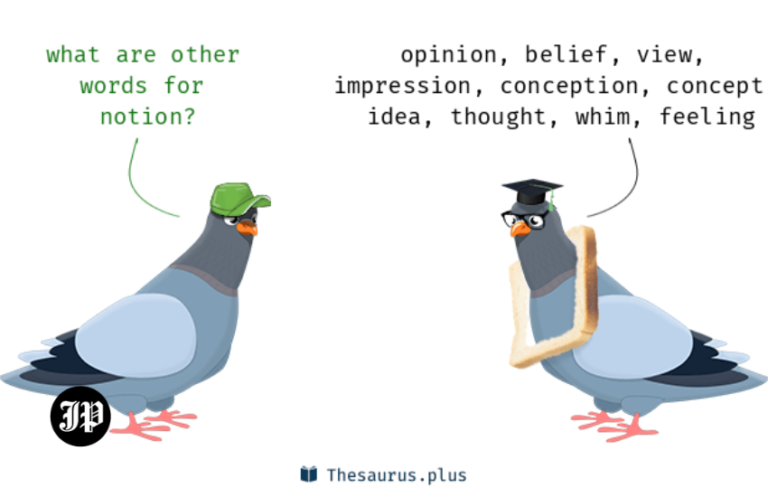When we talk about a “notion,” we’re referring to an idea, belief, or concept that someone holds. A notion can be as simple as a fleeting thought or as complex as a deeply held conviction. Understanding the various synonyms of “notion” helps us express our ideas more precisely and effectively in communication.
In this article, we’ll dive into the world of “notion synonym,” exploring the different words and phrases that can be used interchangeably with “notion.” We’ll also discuss the subtle differences between these synonyms to help you choose the right word for your context.
Understanding “Notion Synonym”
A “notion synonym” is a word that can be used in place of “notion” without changing the meaning of the sentence. However, each synonym carries its own connotations and nuances. Let’s explore some of the most common synonyms for “notion.”
1. Idea
“Idea” is perhaps the most direct synonym for “notion.” Both words can be used to describe a thought or plan that forms in someone’s mind. However, “idea” often implies a more developed or concrete concept than “notion.”
- Example: She had the notion that he was lying, but she needed more evidence to turn it into a fully-formed idea.
2. Concept
“Concept” is another close synonym to “notion,” often used in more formal or academic contexts. While a notion can be a vague or undefined thought, a concept usually refers to an idea that has been more fully developed and articulated.
- Example: The notion of freedom is central to many political philosophies, but the concept of freedom can vary widely between cultures.
3. Belief
“Belief” is a synonym for “notion” that carries a stronger connotation of conviction or faith. When someone has a belief, it usually indicates that they hold that notion with a certain level of confidence or trust.
- Example: His notion that hard work always pays off is more of a belief that guides his daily actions.
4. The Perception
“Perception” can also be used as a synonym for “notion,” particularly when referring to the way someone views or understands something. Perception often implies that the notion is influenced by personal experiences or biases.
- Example: Her notion that the project was doomed to fail was more a reflection of her negative perception of the team.
5. Thought
“Thought” is a versatile synonym for “notion” that can be used in both casual and formal contexts. It refers to any idea or mental process that occurs in the mind.
- Example: The notion that he could complete the task in one day was just a passing thought, not a serious plan.
Why Understanding Synonyms Matters
In language, synonyms allow us to add variety and precision to our communication. Using a range of words like “notion,” “idea,” and “concept” helps to keep your writing and speech dynamic and engaging. Moreover, understanding the subtle differences between these synonyms allows you to convey exactly what you mean.
1. Enhancing Communication
By choosing the right synonym, you can ensure that your audience understands your message clearly. For example, using “belief” instead of “notion” might convey a stronger sense of conviction, while “concept” might imply a more formal or structured idea.
2. Adding Nuance
Different synonyms for “notion” can add different shades of meaning to your communication. For instance, “perception” might suggest that a notion is subjective, while “idea” might imply that it’s more concrete.
3. Improving Writing
For writers, understanding synonyms is crucial for avoiding repetition and maintaining the reader’s interest. Instead of repeating the word “notion” multiple times, you can use synonyms like “thought,” “idea,” or “belief” to keep your writing varied and engaging.
The Evolution of the Word “Notion”
The word “notion” has an interesting history that has influenced its current usage and meaning. Understanding this evolution can provide deeper insights into the various synonyms for “notion.”
1. Origins of the Word
The term “notion” originated from the Latin word “notio,” which means “a becoming acquainted with” or “a conception.” Over time, the word evolved in the English language to represent a general idea or understanding of something.
2. Changes in Meaning Over Time
As language evolved, so did the meaning of “notion.” It was initially used to refer to a basic understanding or impression, but over time, it took on additional meanings, including a vague or whimsical idea.
3. Modern Usage
Today, “notion” is used in various contexts to describe everything from a simple thought to a more complex belief or idea. The versatility of the word has made it a staple in the English language, leading to the development of multiple synonyms that cater to different contexts and nuances.
How to Use “Notion” and Its Synonyms Effectively
Using “notion” and its synonyms effectively in your writing or speech requires an understanding of their subtle differences. Here are some tips for choosing the right word based on your context:
1. Context is Key
Always consider the context in which you’re using the word. If you’re discussing a vague or undefined idea, “notion” might be the best choice. If the idea is more developed or formal, “concept” or “idea” might be more appropriate.
2. Consider the Audience
Think about who you’re communicating with. For a general audience, “idea” or “thought” might be the most accessible synonyms. For a more academic or professional audience, “concept” or “perception” might be better suited.
3. Avoid Overuse
While it’s important to use synonyms to add variety to your communication, be careful not to overuse any single word. Mixing up your use of “notion” with its synonyms can keep your writing fresh and engaging.


